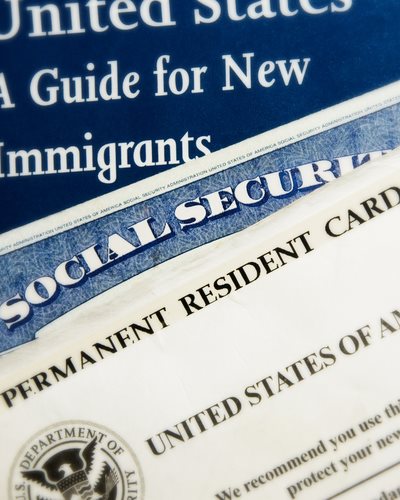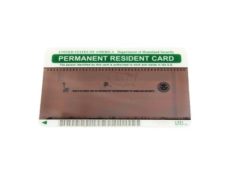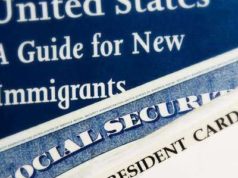
Green Card Process, Forms and Eligibility
A Green Card, also known as a permanent resident card, is a document that enables foreign-born individuals to live and work in the United States on a permanent basis. The process of obtaining a Green Card is often complex and subject to various restrictions and eligibility requirements. In this article, we will provide an overview of the Green Card process, as well as highlight key government resources that immigrants can access throughout the application process. We will also reference specific statutes and legal forms associated with the Green Card process to provide a deeper understanding of the steps involved.
Overview of Green Card Eligibility
The Green Card process is governed by U.S. immigration law, which outlines specific eligibility criteria that foreign-born individuals must meet in order to obtain a Green Card. Some of the main eligibility factors include:
1. Family-based immigration – An individual can obtain a Green Card through a family member who is a U.S. citizen or Legal Permanent Resident (LPR). The specific forms and requirements for this process can be found under Statute 8 U.S. Code § 1151 and 8 U.S. Code § 1153.
2. Employment-based immigration – An individual can obtain a Green Card through employment-based immigration such as job offers or investment. The Department of Labor plays a critical role in this process, specifically in the job offer labor certification process. The forms and requirements for labor certification can be found under Statute 20 CFR § 656.
3. Refugee status/Asylum – An individual can apply for a Green Card if they are a refugee or have been granted asylum status. The specific forms and requirements for this process can be found under Form I-730 Refugee/Asylee Relative Petition and Form I-485 Adjustment of Status.
4. Diversity Visa Lottery – The Diversity Visa Program is a lottery that provides visa applications to people from countries with low immigration rates to the U.S. The specific forms and requirements for this process can be found under Form DS-5501 Diversity Visa Lottery.
Green Card Application Process
The Green Card application process is typically complex and lengthy, often involving multiple steps and government agencies. Some of the main steps include:
1. Filing an Immigrant Petition: The first step in the Green Card process is filing an immigrant petition with the U.S. Citizenship and Immigration Services (USCIS). This usually includes submitting the application form, along with relevant supporting documents, and payment of any applicable fees. The specific forms and requirements for this process can be found under Form I-130 Immediate Relative/ Fiancé/Employment Based Petitions, Form I-140 Petition for Alien Workers, and Form I-526 Immigrant Petition by Alien Entrepreneur.
2. Visa Application: Once the immigrant petition is approved, the foreign-born individual can apply for an immigrant visa through the State Department at the U.S. embassy or consulate in their home country. The specific forms and requirements for this process can be found under Form DS-260 Application for Immigrant Visa and Alien Registration.
3. Adjustment of Status: If the foreign-born individual is already in the United States with a valid visa, they can apply for Adjustment of Status, which allows them to become a permanent resident without leaving the country. The specific forms and requirements for this process can be found under Form I-485 Application to Register Permanent Residence.
4. Consular Processing: If the individual is outside the United States and is unable to obtain an immigrant visa, they can undergo Consular Processing which would require them to attend an interview at a U.S. embassy or consulate in their home country. The specific forms and requirements for this process can be found under Form DS-260 Application for Immigrant Visa and Alien Registration.
5. Biometrics Appointment: The USCIS will schedule a biometrics appointment for the individual to have their fingerprints taken and photo capture. Biometrics appointments help the USCIS verify an individual’s identity and conduct criminal background checks for security purposes. The specific forms and requirements for this process can be found under Form I-485 Application to Register Permanent Residence.
6. Interview: Applicants for a Green Card will typically have an interview with a USCIS officer, including their spouse if they are applying for a family-based Green Card. During the interview, the USCIS officer will review the application and supporting documents to ensure that the applicant meets all the eligibility criteria for the Green Card. The specific forms and requirements for this process can be found under Form I-485 Application to Register Permanent Residence and Form I-864 Affidavit of Support.
Key Government Resources
For many immigrants, navigating the Green Card application process can be challenging, which can be made worse by language barriers. Fortunately, the U.S. government provides various resources and services to help individuals throughout the application process.
1. U.S. Citizenship and Immigration Services (USCIS): The USCIS is responsible for administering the Green Card application process. The USCIS website provides detailed information about the eligibility criteria, application process, and required forms and documents.
2. U.S. Department of State (DOS): The DOS manages the application process for immigrants applying for visas at U.S. embassies and consulates abroad. The DOS website provides information on the visa application process, as well as the contact details for U.S. embassies and consulates around the world.
3. U.S. Department of Labor (DOL): The DOL plays a critical role in the employment-based Green Card application process. The DOL website provides guidance on the job offer labor certification process, along with forms such as Form ETA-9089 Application for Permanent Employment Certification.
4. U.S. Citizenship and Immigration Services Office of Citizenship (OoC): The OoC provides resources and materials to help immigrants prepare for the naturalization process, including information on the naturalization test, language requirements, and resources for civics and language education.
Conclusion
The Green Card process is a complex and often lengthy process that requires careful attention to detail and eligibility requirements. For many immigrants, navigating this process can be challenging, but the U.S. government provides various resources and services to help individuals throughout the application process. It is important for individuals to carefully review all eligibility requirements and to consider working with an experienced immigration attorney to ensure that the application is completed accurately and on time. By utilizing government resources and understanding the specific forms and requirements for each step of the process, individuals can greatly increase their chances of successfully obtaining a Green Card.
__________________________________________________________________
More about Green Card processes
1. The Permanent Resident Card, also known as a green card, means that the individual has earned the legal right to become a permanent resident of United States of America. While a green card does not afford an individual all the potential benefits that are available to a resident of this country, it is a precursor to obtaining these privileges, and for the positive things brings, it is one of the most sought after forms of documentation in America and, for that matter, the world.
2. Analogous to how trying to get a table in a crowded restaurant may be easier for couples who can sit at either a small or large table, the green card application process may be easier for certain people based on their relationship to the petitioner and the amount of visas, permanent residents, married immigrants.
3. The green card application process can be a difficult one, even for someone who is a relative of the citizen who petitions on his or her behalf. In terms of immediate family relationships, as noted above, though, the process is by no means made automatic, but it is made significantly easier by unlimited visas that therefore do not have to be waited upon to become available.
4. Either one or two steps will be involved in the green card through family option. In either case, an I-130 Petition for Alien Relative visa form must be filed as well as an I-485 Application to Register Permanent Residence or Adjust Status. In the one-step option, also known as concurrent filing, the I-130 and I-485 forms can be filed at the same time.
It also should be noted that while petitioners more commonly file these forms within the United States, it is also possible to apply abroad for a visa, travel to the country on the visa, and acquire permanent residency upon arrival. When applying through consular processing, concurrent filing is an option, too.
5. Visas are common for those foreign nationals who wish to temporarily provide services for an employer, receive special training or otherwise contribute to a cultural exchange. However, if a living or working assignment is to become permanent, an application for a green card through work is very necessary.
Green cards are not always a possibility for foreign-born laborers, as the first inclination of an American employer should be to fill any vacancies with U.S. citizens. If this is not feasible, however, then there are several paths to a Permanent Resident Card through an employer.
The petition for a green card through job offer must come through the employer, and may need to be accompanied by a Labor Department Certification and a letter of intent from the employer to hire the individual. Often, the prospective employee will appeal directly to his or her future boss, who will fill out the I-140 Petition for an Alien Worker.
6. Green cards are also available for foreign businessmen and investors who create new jobs for workers in America, which are sorely needed in most job sectors. This occupation category utilizes the I-526 Petition for an Alien Entrepreneur. As for the I-130 Special Immigrant Form, this belongs to certain very specific classes of immigrants, including Iraqi and Afghani translators.
7. A select few persons with extraordinary ability in science, arts and business, meanwhile, will qualify for a National Interest Waiver, eliminating the need for a visa application by virtue of the name.
8. While the green card lottery, or application for a Diversity Visa, is far removed from a state lottery where thousands or potentially millions in jackpots can be won, there are similarities. For one, long odds must be overcome to win in both lotteries. As the name implies, there is also a random drawing element to both the green card lottery and that of legal gambling
Right from the naming system that comes along with the green card lottery, it is evident that, while it is a wholly viable process for obtaining a green card, it is not a standard process by any means; the green card lottery is known officially as the Diversity Visa. One critical thing to know about the green card lottery application process is that it is completely electronic. While fees will be required to process biometrics information (i.e. fingerprints) for receipt of the physical card, there is no fee to file the application.
Thus, anyone who seeks a fee to help you with your application is most likely trying to scam you out of your money. While the drawings are more or less random, this is small consolation to some given the idea that some people will have to work for years on a visa while others may win permanent residence in a matter of months.
9. The green card applicant will want to have the right mindset when approaching an interview. The green card applicant should prepare for their green card interview well ahead of time, as this interview is not a mere formality. Certainly, one will want to check lists of requirements provided by the USCIS and Department of State, but fundamental proofs of identification such as birth certificates, passports and passport-style photos, medical records, and alien registration forms are crucial to have on hand.
It would be prudent, as well, to consult with someone who has undergone the interview process before, and can help the applicant prepare for the types of questions he or she should expect during the interview. Above all else, though, the official reviewing the applicant’s case will be looking for inconsistencies in information, so it is advantageous for him or her to answer all questions honestly and directly.




























